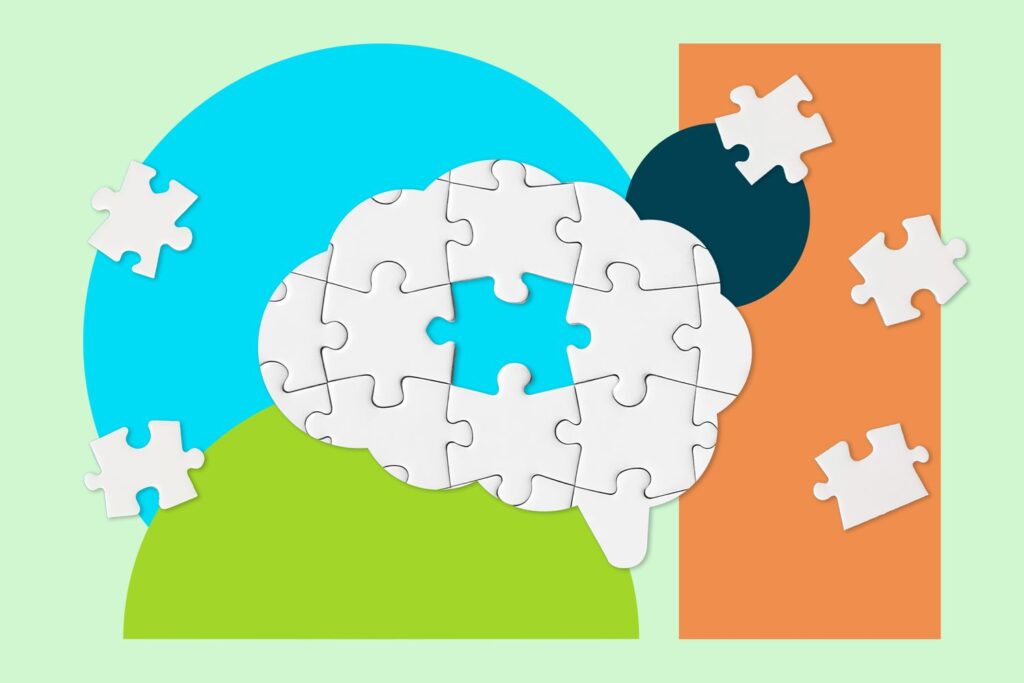Key Takeaways
- The gut and brain communicate through the gut-brain axis, influencing mood, memory, and stress regulation.
- Imbalances in gut bacteria and inflammation may contribute to depression and increase Alzheimer’s disease risk.
- A diet rich in polyphenols and fermented foods, along with regular exercise and good sleep, supports gut and brain health.
Gut health supports more than digestion. Studies show that gut bacteria help shape brain health and may influence Alzheimer’s disease risk.
Following a gut-healthy lifestyle can promote brain health as you age. Researchers are also testing Alzheimer’s and dementia treatments that target the gut-brain axis, a two-way communication pathway between the gut and the central nervous system.
What Is the Gut-Brain Axis?
The gut and the central nervous system (the brain and spinal cord) constantly communicate through hormones and neurotransmitters. This network is called the gut-brain axis.
Bacteria in the intestines, known as the gut microbiome, produce molecules that can travel through the blood or signal the brain via the vagus nerve, which helps regulate blood pressure, breathing, stress, mood, and digestion.
“When the gut is healthy and balanced, it sends ‘good’ signals that support brain health. But when it’s disturbed—by stress, poor diet, or antibiotics—it can send “stress” signals that may impair memory or mood,” Hariom Yadav, PhD, director of the USF Center for Microbiome Research, told Verywell in an email.
The Gut Produces Mood-Boosting Chemicals
One of the most direct ways the gut influences the brain is through chemical messengers that affect mood and cognition. The gut produces 90% of the body’s serotonin, a mood-boosting hormone involved in regulating memory, sleep, and stress.
“Improving gut health isn’t just about avoiding stomach issues—it’s about improving mental and emotional well-being too,” Yadav said.
Some research suggests that gut dysbiosis—an imbalance between good and bad gut bacteria—may contribute to depression and cognitive decline.
A small 2023 study published in the Journal of Psychiatry and Neuroscience found that supporting a diverse gut microbiome with probiotic supplements helped improve memory and reduce depression symptoms in people with major depressive disorder.
Gut Inflammation May Impact Brain Health
Beyond mood and memory, gut health may also affect the brain through inflammation.
“Inflammation could lead to more gut permeability, which in turn could drive immune activation. This includes activation of immune cells in the brain,” Barbara Bendlin, PhD, a professor of medicine in the division of geriatrics and gerontology at the UW-Madison School of Medicine and Public Health, and one of the senior authors of the study, told Verywell in an email.
Over time, persistent activation of these cells may harm the brain and “exacerbate Alzheimer’s disease,” Bendlin said.
Researchers still have more to learn, but future Alzheimer’s disease treatments may target gut inflammation.
“We don’t have evidence that eating a certain diet or taking a probiotic can prevent Alzheimer’s disease pathology. We do hope that our studies can help us identify ways to change the gut to promote brain health, but more research will be needed,” Bendlin added.
A Gut-Healthy Diet May Support Cognitive Health
Polyphenol-rich foods are part of the MIND diet, an anti-inflammatory eating pattern that has been shown to support brain health. Consuming more fermented foods, like kimchi and yogurt, and reducing the intake of ultraprocessed foods also helps keep both the gut and brain healthy.
“Avoiding too much processed food, sugar, and unnecessary antibiotics helps maintain a healthy gut environment, which supports better focus, mood, and memory,” Yadav said.
Certain medications, environmental toxins, infections, smoking, and stress can also contribute to gut dysbiosis.
Simple daily habits like “regular physical activity, good sleep, and stress management” are equally important to diet because they all impact the microbiome, said Yadav.
“Gut health changes with age, lifestyle, and even stress levels, so taking care of it is a lifelong process,” he added. “The exciting part is that we can actively shape our microbiome through diet and lifestyle choices.”


:max_bytes(150000):strip_icc()/StephanieBrownnewheadshot-e5ca9ba2a404491384e9300a7871f190.jpg)